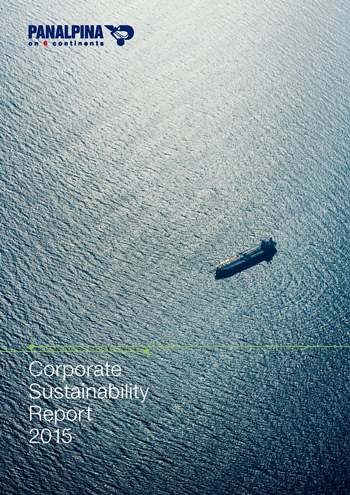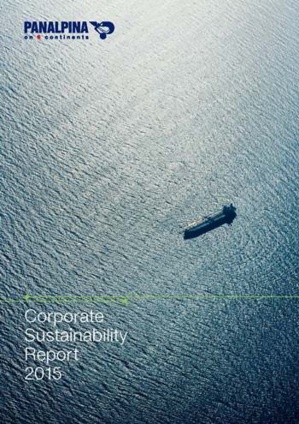Dailycsr.com – 20 April 2016 – Panalpina has come out with its Corporate Sustainability Report for the year of 2015, which highlights the company’s approach towards sustainable efforts and its “corporate responsibility”. Moreover, the report also enlists the actions taken in this line by the company during the year of 2015.
Giving a detailed description of the methods Panalpina followed in the year of 2015 to “engage with its stakeholders and to assess its impacts on the environment and the communities” in and around the regions where the company operates. The said report has been prepared following the “Global Reporting Initiative (GRI) G4 Guidelines” to demonstrate the “comprehensive approach” adopted by Panalpina for documenting and analysing its activities whereby “evaluating how sustainability relates to its strategy”.
In the words of Panalpina’s Global Head of Quality, Health, Safety & Environment, Lindsay Zingg:
“Panalpina’s corporate sustainability programs and reporting are continuously evolving to meet the expectations of our stakeholders and to reflect our increased understanding of where our impacts and opportunities are greatest”.
In the year of 2015, Panalpina carried on its work for “reducing its environmental impact” while the focus was on the greenhouse gas emissions. During the “UN Climate Talks” that took place in the month of December 2015 at Paris, Panalpina was announced “the only logistics company so far to commit to set reduction targets as part of the Science Based Targets Initiative” over hundred international companies.
The customers at Panalpina “expect” it to “address its environmental impacts” by taking appropriate steps to “reduce” the same. The Chief Commercial Officer at Panalpina, Karl Weyeneth said:
“Many of our customers want to have data on the environmental impacts of our services, and require us to include sustainability and environmental topics in the tender process.”
Below are the highlights from Panalpina’s CSR report for the year 2015, as per Ethicalperformance:
Giving a detailed description of the methods Panalpina followed in the year of 2015 to “engage with its stakeholders and to assess its impacts on the environment and the communities” in and around the regions where the company operates. The said report has been prepared following the “Global Reporting Initiative (GRI) G4 Guidelines” to demonstrate the “comprehensive approach” adopted by Panalpina for documenting and analysing its activities whereby “evaluating how sustainability relates to its strategy”.
In the words of Panalpina’s Global Head of Quality, Health, Safety & Environment, Lindsay Zingg:
“Panalpina’s corporate sustainability programs and reporting are continuously evolving to meet the expectations of our stakeholders and to reflect our increased understanding of where our impacts and opportunities are greatest”.
In the year of 2015, Panalpina carried on its work for “reducing its environmental impact” while the focus was on the greenhouse gas emissions. During the “UN Climate Talks” that took place in the month of December 2015 at Paris, Panalpina was announced “the only logistics company so far to commit to set reduction targets as part of the Science Based Targets Initiative” over hundred international companies.
The customers at Panalpina “expect” it to “address its environmental impacts” by taking appropriate steps to “reduce” the same. The Chief Commercial Officer at Panalpina, Karl Weyeneth said:
“Many of our customers want to have data on the environmental impacts of our services, and require us to include sustainability and environmental topics in the tender process.”
Below are the highlights from Panalpina’s CSR report for the year 2015, as per Ethicalperformance:
- Panalpina received its highest score to date in the Carbon Disclosure Project supply chain program, with 94 points out of 100
- CO2 emissions decreased by 4% from 2014 levels
- Employees organized over 500 charitable and environmental activities during the 2015 Global Sustainable Action Day
- Paper usage decreased by 16%, water by 11% and electricity by 5%


 Panalpina Continues To Tread Sustainably
Panalpina Continues To Tread Sustainably





 Companies
Companies